In-Depth
WPC 2014 in Quotes: 12 Key Themes
WEB EXCLUSIVE: A recap of some of the important themes Microsoft executives spotlighted at the 2014 Worldwide Partner Conference keynotes.
- By Scott Bekker
- July 21, 2014
As it starts every fiscal year in July, Microsoft uses its Worldwide Partner Conference (WPC) to telegraph to the ecosystem what its biggest priorities are for the next 12 months. Here are a dozen key quotes from Microsoft executive keynotes during the show last week in Washington, D.C., that lay out clear markers for the channel.
***
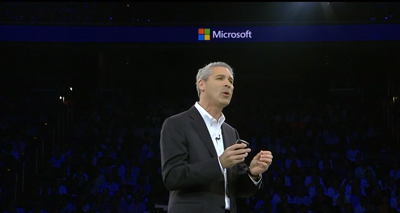
"Our success in a mobile-first, cloud-first world will be achieved through a highly successful partner ecosystem. The complexion of this ecosystem may be a little different than it has been in the past, the business models reflected in it may be a little bit different, but I'm confident there's a place for every single one of you in this future, and we want you with us."
--Phil Sorgen, Corporate Vice President, Worldwide Partner Group, Microsoft
WPC 2014 was Phil Sorgen's first partner conference as the Microsoft channel chief, and he took the stage with open questions among Microsoft partners about how much Microsoft values them and how many partners Microsoft management really believes are necessary. Actions always speak louder than words, but Sorgen closed his keynote with as strong an endorsement of Microsoft remaining a partner-led company with a huge ecosystem as you can ask for.
***
"What you have done in terms of the feedback you give us, the push you give us, that constant pursuit you have for customer success -- many times you're critical of us. And that is what I believe has pushed us collectively to have all the success over the years." --Satya Nadella, CEO, Microsoft.
The 800-pound gorilla in the room as Nadella spoke in Washington, D.C., was whether and how many layoffs were coming for Microsoft (18,000 was the number, announced later). But for the partners in the Verizon Center in Washington, they wanted to know how much this new CEO valued them. Nadella chose to echo a sentiment his predecessor Steve Ballmer had expressed at previous WPCs, by thanking partners and saying their attention and criticisms make Microsoft better.
***
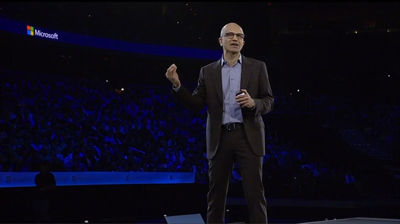
"Take advantage of what we've done, build on us, extend, push us. And let's collectively serve our customers to be able to transform their businesses and their lives. That's the opportunity ahead of us."
--Satya Nadella, CEO, Microsoft
While Nadella values partners, the ones he focuses on the most are those that have development capabilities, particularly those who can extend and customize in cloud and mobile. When he talks about partners, that's the type of organization he seems to be imagining.
***
"The most strategic developer surface area for us is Office 365." --Satya Nadella, CEO, Microsoft.
Nadella spoke about Microsoft's efforts to put development hooks in its cloud and other products and left no doubt about which cloud product was most important.
***
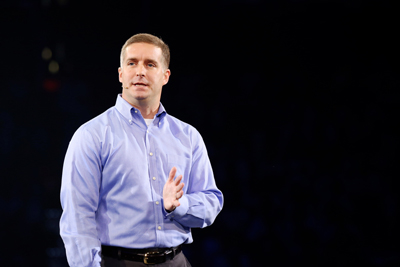
"A year ago, we were talking about $1 billion of Office 365 revenue run rate, and now we're talking about 2.5, and that number is going to keep growing."
--John Case, Corporate Vice President, Microsoft Office Division
Helping to explain why Nadella said Office 365 was the most strategic developer surface area for Microsoft, Case enumerated how explosive the growth is on the Office 365 side.
***
"So we built this Delve product to really enable organizations to become true knowledge organizations...now, every individual in their organization has the power to discover information and be more productive." --Satya Nadella, CEO, Microsoft.
In his massive memo just ahead of WPC, Nadella set out "dual use," the idea that technology should help people combine their personal and professional lives seamlessly, as a core concept for Microsoft. In the memo, he provided some key examples of technologies Microsoft was working on to that end, including well-known ones like Cortana, the Siri-like personal assistant for Windows Phone, and the self-explanatory Skype translator.
One that didn't have a lot of context was Delve. Microsoft dedicated an entire demo at WPC to Delve, a technology described as an example of ambient intelligence. Delve is designed to provide users with a dashboard that brings personalized relevant information to their desktops.
***
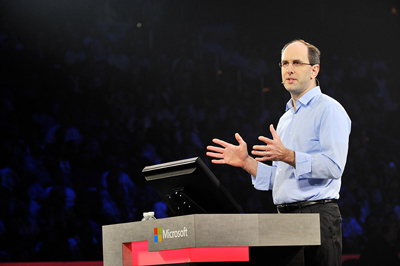
"Ultimately, we think there's going to be three large hyper-scale providers out there in the world that are going to be able to achieve this type of scale footprint, basically us -- Microsoft -- Amazon and Google. Our plan is to differentiate from the other two by the level of enterprise-grade support we provide you, as well as the unique hybrid capabilities that enable you to deliver integrated customer solutions. And with Azure, we're committed to delivering the best enterprise-grade cloud service out there."
--Scott Guthrie, Executive Vice President, Microsoft Cloud and Enterprise Group
Guthrie provided interesting detail for how Microsoft is putting effort into creating Azure regions around the world. A region is a cluster of up to 16 datacenters, with each datacenter large enough to fit two jumbo jets inside. Guthrie said Microsoft has 17 publicly available regions around the world, which he said was two times as many as Amazon has and five times as many as Google offers.
***
"Around 15 percent of Azure today has Linux and various packages of Linux. And so that means we have the most open infrastructure for any kind of solution." --Satya Nadella, CEO, Microsoft.
The Linux load on Azure datacenters is yet another data point when making the case that Microsoft seems more open to working with other people's technology.
***
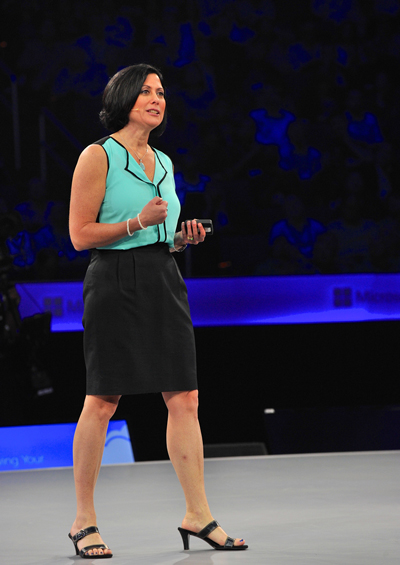
"Successful partners who have already made that move to a managed cloud service practice experience four times the contribution margin over their existing on-premises business. That's the kind of acceleration that we want for every single one of you."
--Gavriella Schuster, General Manager, Worldwide Partner Marketing and Programs, Microsoft
Schuster took to the stage to announce a number of enhancements to the Microsoft Partner Network, including cloud-focused competencies, streamlined requirements and enhanced benefits. Microsoft was heavily promoting a study it commissioned from IDC to help partners reach profitability in the cloud.
***
"Fourteen percent." --Kevin Turner, CTO, Microsoft.
Turner acknowledged what industry analysts and others are saying -- when all types of end user devices are counted, Microsoft is no longer the computing behemoth it once was. Far from the 90 percent market share Microsoft enjoyed when the PC was the only significant access device, Microsoft is in the 14 percent range when all smartphones and tablets are taken into account.
***
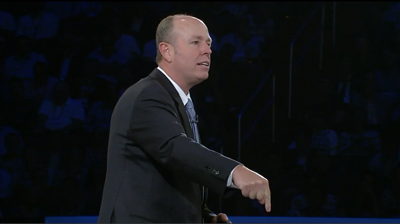
"We will not provide any government with direct unfettered access to customers' data. In fact, we will take them to court, if necessary."
--Kevin Turner, COO, Microsoft
A year ago, Turner used his WPC bully pulpit to attack Google for invading customers' privacy. The criticism rang hollow in light of the then-recent revelations that Microsoft, Google and others may have cooperated with the U.S. National Security Agency to allow access to customer data stored in their systems.
This year, Turner still threw a few zingers Google's way, but addressed the national security data demands of U.S. three-letter agencies directly, and in a way that the heavily international audience could appreciate. Turner said Microsoft would not provide encryption keys to governments, would never assist in government efforts to break Microsoft's encryption and would contest requests to disclose customer data stored outside U.S. borders.
***
"This notion of universal Windows apps is a very powerful concept because we're now aggregating the 300-plus-million-socket run rate of Windows into one opportunity for our developers." --Satya Nadella, CEO, Microsoft.
It's hard to remember, but when Microsoft first showed Windows 8, there was a lot of partner excitement about the product. Much of it hinged on the idea of a single infrastructure that would allow developers to write once and have the apps or programs run across multiple devices -- Windows Phones, Windows tablets and PCs. In reality, that universal infrastructure ended up being a lot longer in delivery than anticipated, but Nadella made the case that it's around the corner.
More from WPC 2014:
About the Author
Scott Bekker is editor in chief of Redmond Channel Partner magazine.